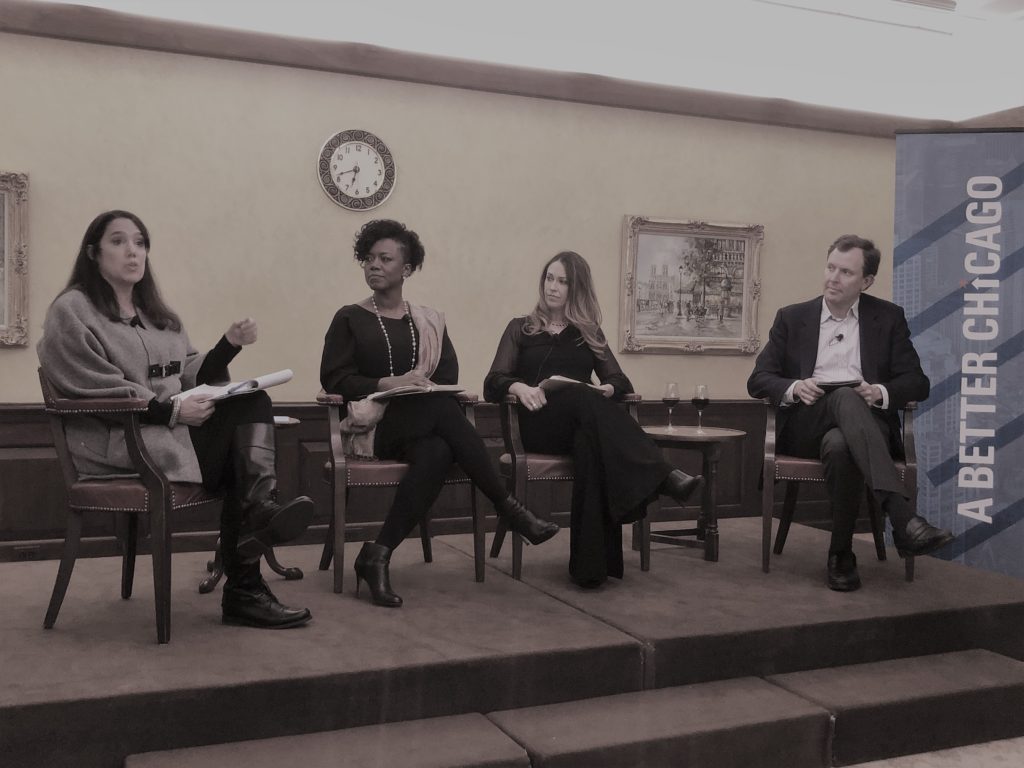Mayoral Power + Education in Chicago: What to know before Election Day

(L-R) Ginger Ostro, Dominique Jordan Turner, Sara Ray Stoelinga with A Better Chicago’s Liam Krehbiel
As the mayoral election approaches and Chicagoans contemplate what new leadership will mean for our city, education continues to be front of mind for voters. On February 13, A Better Chicago brought together three of our city’s top education experts for a fireside chat. Ginger Ostro, Sara Ray Stoelinga and Dominique Jordan Turner discussed the history of mayoral control and its impact on education, the role our mayor plays in shaping and advancing education policies and the issues that are most relevant for our city today.
Understanding the key policies and historical moments that have defined the Chicago mayor’s role in education is critical to understanding the current landscape. To empower you to make an informed choice on Election Day, and provide some clarity in the complex world of education reform in Chicago, we’ve pulled together a few major takeaways from our expert panelists:
History continues to shape the mayor’s role
The landscape our next mayor is walking into has largely been shaped by two pieces of state legislation from the 80s and 90s that, at once, worked to decentralize and then re-centralize control. The Chicago School Reform Act (CSRA) of 1988 de-centralized power within Chicago Public Schools (CPS) through the creation of local school councils, which served to transition control over budgets, curriculum and personnel from the district to principals. This piece of legislation also gave the community more power over selecting board of education members through a nominating committee. Seven years later, the Chicago School Reform Amendatory Act of 1995 largely reversed the CSRA, as it gave power back to the mayor to hold schools accountable and appoint all members of the board of education. Local school councils remained, as they do today, making Chicago a unique public school system.
Difficult decisions are ahead
Our city’s next mayor will face several multifaceted education policy questions without easy or universally popular answers. Questions include: Should Chicago’s school board be elected, appointed or a hybrid model? How do we reconcile a declining student population with the need to further support community schools and keep a balanced budget? Where does the future hold for charter schools in Chicago? How will we close the achievement gap that still exists along racial and socio-economic lines in our city?
In his oped in The Atlantic reflecting on his years in leadership, outgoing mayor Rahm Emanuel outlined his advice on the way forward.
Nuance and complexity are running themes
As we prepare to elect a new mayor, we must acknowledge the lessons learned and urge candidates to embrace the nuances and complexities that define Chicago’s education landscape. It’s imperative for Chicago’s new mayor to see education as more than a business decision when choosing how to allocate resources as every decision has the potential to directly impact the lives of our youth, from early childhood to career.
What’s next?
We hope this has you thinking deeply about what interventions and policies can create the best opportunities for all Chicago students. In the lead up to Election Day, these resources can shine a light on where the 2019 mayoral candidates stand on education and other key issues:
Chicago Tribune Chicago Mayor Candidate Quiz
WBEZ Candidate’s Education Positions Guide
Ballotpedia Overview
Ballot Ready Interactive Tool
